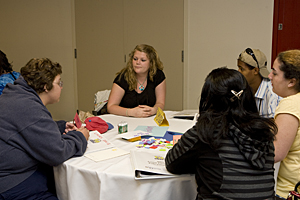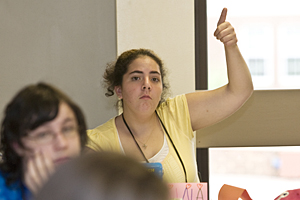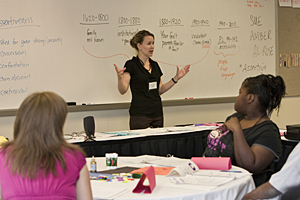

- Rozovsky wins prestigious NSF Early Career Award
- UD students meet alumni, experience 'closing bell' at NYSE
- Newark Police seek assistance in identifying suspects in robbery
- Rivlin says bipartisan budget action, stronger budget rules key to reversing debt
- Stink bugs shouldn't pose problem until late summer
- Gao to honor Placido Domingo in Washington performance
- Adopt-A-Highway project keeps Lewes road clean
- WVUD's Radiothon fundraiser runs April 1-10
- W.D. Snodgrass Symposium to honor Pulitzer winner
- New guide helps cancer patients manage symptoms
- UD in the News, March 25, 2011
- For the Record, March 25, 2011
- Public opinion expert discusses world views of U.S. in Global Agenda series
- Congressional delegation, dean laud Center for Community Research and Service program
- Center for Political Communication sets symposium on politics, entertainment
- Students work to raise funds, awareness of domestic violence
- Equestrian team wins regional championship in Western riding
- Markell, Harker stress importance of agriculture to Delaware's economy
- Carol A. Ammon MBA Case Competition winners announced
- Prof presents blood-clotting studies at Gordon Research Conference
- Sexual Assault Awareness Month events, programs announced
- Stay connected with Sea Grant, CEOE e-newsletter
- A message to UD regarding the tragedy in Japan
- More News >>
- March 31-May 14: REP stages Neil Simon's 'The Good Doctor'
- April 2: Newark plans annual 'wine and dine'
- April 5: Expert perspective on U.S. health care
- April 5: Comedian Ace Guillen to visit Scrounge
- April 6, May 4: School of Nursing sponsors research lecture series
- April 6-May 4: Confucius Institute presents Chinese Film Series on Wednesdays
- April 6: IPCC's Pachauri to discuss sustainable development in DENIN Dialogue Series
- April 7: 'WVUDstock' radiothon concert announced
- April 8: English Language Institute presents 'Arts in Translation'
- April 9: Green and Healthy Living Expo planned at The Bob
- April 9: Center for Political Communication to host Onion editor
- April 10: Alumni Easter Egg-stravaganza planned
- April 11: CDS session to focus on visual assistive technologies
- April 12: T.J. Stiles to speak at UDLA annual dinner
- April 15, 16: Annual UD push lawnmower tune-up scheduled
- April 15, 16: Master Players series presents iMusic 4, China Magpie
- April 15, 16: Delaware Symphony, UD chorus to perform Mahler work
- April 18: Former NFL Coach Bill Cowher featured in UD Speaks
- April 21-24: Sesame Street Live brings Elmo and friends to The Bob
- April 30: Save the date for Ag Day 2011 at UD
- April 30: Symposium to consider 'Frontiers at the Chemistry-Biology Interface'
- April 30-May 1: Relay for Life set at Delaware Field House
- May 4: Delaware Membrane Protein Symposium announced
- May 5: Northwestern University's Leon Keer to deliver Kerr lecture
- May 7: Women's volleyball team to host second annual Spring Fling
- Through May 3: SPPA announces speakers for 10th annual lecture series
- Through May 4: Global Agenda sees U.S. through others' eyes; World Bank president to speak
- Through May 4: 'Research on Race, Ethnicity, Culture' topic of series
- Through May 9: Black American Studies announces lecture series
- Through May 11: 'Challenges in Jewish Culture' lecture series announced
- Through May 11: Area Studies research featured in speaker series
- Through June 5: 'Andy Warhol: Behind the Camera' on view in Old College Gallery
- Through July 15: 'Bodyscapes' on view at Mechanical Hall Gallery
- More What's Happening >>
- UD calendar >>
- Middle States evaluation team on campus April 5
- Phipps named HR Liaison of the Quarter
- Senior wins iPad for participating in assessment study
- April 19: Procurement Services schedules information sessions
- UD Bookstore announces spring break hours
- HealthyU Wellness Program encourages employees to 'Step into Spring'
- April 8-29: Faculty roundtable series considers student engagement
- GRE is changing; learn more at April 15 info session
- April 30: UD Evening with Blue Rocks set for employees
- Morris Library to be open 24/7 during final exams
- More Campus FYI >>
11:21 a.m., June 25, 2009----From 1620 to the beginning of the 19th century, persons with disabilities were kept at home by their families; and from 1800-1880 they were either institutionalized or at home, but still not out and about in society.
However, from 1940 on, the climate began to change, and persons with disabilities entered the public sphere.
Their value to society and their rights as citizens were recognized, and the Americans with Disabilities Act was passed in 1990 to protect them and give them accessibility, not only physically, but to jobs, transportation and education.
This was the brief history lesson for the participants in the Junior Partners in Policymaking program for 20 young adults, with and without disabilities, ages 15-22, who were living on the University of Delaware campus last week with classes in the day and entertainment and social programming in the evenings, from art therapy to karaoke.
Coordinated by doctoral UD student Megan Pell, who has eight years experience as a special education teacher in Maryland and Brazil, the program's goal is to encourage the participants to become advocates for those with disabilities and for themselves. The program links those who want increased social and political support for individuals with disabilities with those who make public policy.
The classes cover such topics as assertiveness, self-determination and understanding government processes, and culminated in a visit to Legislative Hall in Dover.
One session was on setting goals and working towards them. “What were your goals when you were five years old?” Pell asked with a variety of responses from eating ice cream with mom to riding a bike without training wheels.
The lesson continued up the age ladder to the present. One student wanted to become a wrestler, another wanted to run a farm with animals, another to be a nurse and one wanted a job to help her mom. Using nursing as an example, Pell suggested visiting a hospital, getting to know people there and volunteering as steps along the way to training as a nurse.
“Set your goals, be persistent, assert yourself, practice advocacy, take steps to do what you want to do and share ideas,” Pell encouraged.
At least one participant has been involved in the Christina School District's Networks school-based enterprises programs, which provides work opportunities in food services, graphics, auto work and other fields. Pell suggested that participants could advocate for similar programs elsewhere.
Another class session dealt with practicing advocacy. The Delaware General Assembly is considering laws for improving access to dentistry and the para-transit system for persons with disabilities. The group split up into three sections to discuss letter writing, telephone calls and testimony as advocacy skills.
The next day they visited State Rep. Richard Cathcart (R-Middletown), had a tour of Legislative Hall and received certificates for completing the program.
Sponsored by the Delaware Developmental Disabilities Council, the program has been run by UD's Center for Disabilities Studies and is offered every other year. The program is unique nationally as it helps young adults to transition into the “senior” Partners in Policymaking program.
UD students who minor in disabilities studies, including Andrea English, Megan Moritz, Denise Jenkins, Greg Neal and Julie Mastrella, assisted Pell with the program. The Disabilities Studies minor program is coordinated by Laura Eisenman, associate professor in the School of Education.
Article by Sue Moncure
Photos by Ambre Alexander



